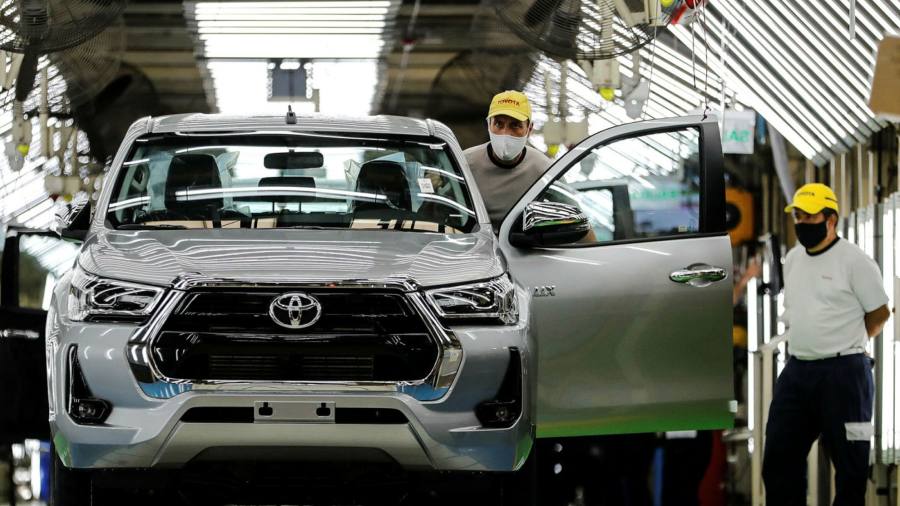[ad_1]
Toyota came within hours of shutting down its UK plants this week because of supply shortages as the US cold snap threatened global car production, according to two people with knowledge of the situation.
The Japanese carmaker was in a “daily battle to avoid a shutdown†across its European network as contagion from its North American supply chain spread, one person said.
The group briefed managers and suppliers that it was preparing to halt UK lines, before reversing its decision several hours later, another person said.
The winter blast that caused mass blackouts in Texas has deepened supply chain disruptions at the world’s largest carmakers, as the pandemic-triggered scarcity in chips is compounded by a fresh shortage in raw chemical materials used for some car components.
The latest disruption means carmakers are facing shortages of key parts such as seats, airbags and dashboards because of bottlenecks further down their supply chains.
The impact is likely to be felt for months, with many chemical facilities in Texas still offline.
In the past week alone, Honda, Toyota, Nissan and Ford have warned that production at car plants in the US, Canada and Mexico will be temporarily halted.Â
They blamed a series of factors from a shortage of petrochemicals caused by the extreme weather in the US to congestion at US ports and a global chip shortage that is affecting both cars and consumer electronics.
Japanese chemicals maker Toray on Friday also revealed that it had issued a “force majeure†declaration to clients for the first time in early March seeking a special exemption from responsibility to supply nylon materials, which are widely used in automotive airbags.Â
Texas is the heartland of American petrochemicals production and supplies an estimated 70 per cent of raw chemical materials that are used in Toray’s nylon fibres.
The huge blackouts triggered by the winter storm in February shut down large chemical plants in Texas and many are taking longer than expected to resume operations.Â
Noting the rarity of force majeure declarations by Japanese chemical makers, Goldman Sachs analyst Atsushi Ikeda said Toray’s move underscored “the severity of the situationâ€.Â
“We believe we need to watch the impact not only on Toray’s earnings, but also on the overall supply chain for airbags and automobiles,†he said in a client note.
Volkswagen chief executive Herbert Diess this week said the company’s production outlook for the entire year “is a little bit unclear due to the weather conditions in the United Statesâ€.
The carmaker is already expected to produce 100,000 fewer cars for the first quarter due to chip-related stoppages, and was unlikely to recover the sales even if the various bottlenecks unblocked by the summer, he warned.
“For the entire year, it’s not possible to say what the situation will be.â€
Speaking at a JPMorgan conference on Monday, Edward Breen, chief executive of US chemical company DuPont, said most of the supply disruptions would probably be resolved by the end of the second quarter.
“Auto production might be down about 1m units during this period of time here,†Breen said. “Clearly, there are shipping logistics issues, especially out on the West Coast.â€Â
The shortage of raw materials complicates a global supply crunch caused by the Covid-19 pandemic as the world’s largest carmakers and consumer electronics manufacturers jostle for semiconductor parts to address a rebound in car demand as well as a lockdown boom in tablets, gaming devices and laptops.Â
The power outages in Texas also forced some chipmakers in the state offline, including Samsung Electronics’ multibillion-dollar fabrication plant in Austin. This week, the South Korean group said it would require more time to resume operations to normal levels.Â
[ad_2]
Source link






